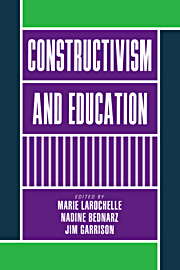Book contents
- Frontmatter
- Contents
- Preface
- List of contributors
- I Introduction
- 1 Constructivism and education: beyond epistemological correctness
- II From epistemological constructivism to teaching: a variety of views
- III Teaching within the constructivist mode: practices and promises
- IV The mediating role of teachers and teacher education
- V Conclusion
- Notes
- References
- Index
1 - Constructivism and education: beyond epistemological correctness
Published online by Cambridge University Press: 04 August 2010
- Frontmatter
- Contents
- Preface
- List of contributors
- I Introduction
- 1 Constructivism and education: beyond epistemological correctness
- II From epistemological constructivism to teaching: a variety of views
- III Teaching within the constructivist mode: practices and promises
- IV The mediating role of teachers and teacher education
- V Conclusion
- Notes
- References
- Index
Summary
For several years now, research conducted within the perspective of epistemological constructivism has allowed us to develop other, fruitful ways of conceiving the problem of knowledge and, with this, the problem of learning. For instance, as constructivism implies that knowledge is always knowledge that a person constructs, it has prompted the development of didactic situations which stress the need to encourage greater participation by students in their appropriation of scholarly knowledge. But how has this basic precept of constructivism contributed to the renewal of day-to-day teaching practices? What sort of participation, construction, and forms of knowledge are involved … and valued?
Most often, it is a “softer” version of constructivism which is favorably considered. Indeed, taking students’ knowledge into account seems to have scarcely modified the usual teaching modus vivendi at any level of instruction one chooses to examine. No doubt students’ points of view are elicited with greater frequency. That is, in fact, the major effect of so-called constructivism on educational practices, as Morf has emphasized in this book. However, such elicitation appears to obey no other end than to identify “what's wrong” with the students’ points of view. Wrong, that is, from the perspective of the knowledge which is to be taught; no account is made of how potentially this sanctioned form of knowledge may present major divergences with student knowledge in terms of nature, scope, and viability. When this is the case, two major issues go by the board: the complexification of students’ knowledge, and the development of a shared, reflexive kind of understanding of the subject and task at hand.
- Type
- Chapter
- Information
- Constructivism and Education , pp. 3 - 20Publisher: Cambridge University PressPrint publication year: 1998
- 20
- Cited by



